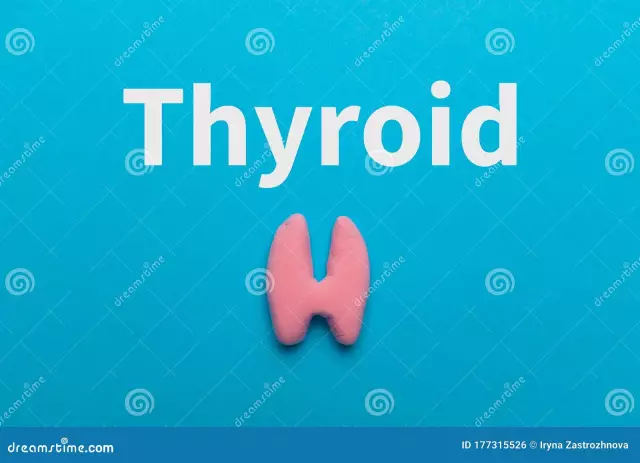- Author Rachel Wainwright wainwright@abchealthonline.com.
- Public 2023-12-15 07:39.
- Last modified 2025-11-02 20:14.
Inflammation of the salivary gland
Brief description of the problem

First, a few words about what saliva is and what its function is. On the surface of the oral mucosa, there are three pairs of large salivary glands and many smaller ducts that produce a specific secret - saliva. We need it for the normal course of digestion processes, in particular, for wetting and softening solid pieces of food, forming a food lump and swallowing food. Inflammation of the salivary gland leads to the fact that it ceases to perform the tasks assigned to it. As a result, there are problems with the production of secretions and difficulty in swallowing food. From this article you will learn about why inflammation of the salivary gland begins to develop, what consequences it leads to, and how to deal with it.
Typology of inflammation of the salivary glands
There are three pairs of large glands in the human oral cavity. Most often, patients are diagnosed with inflammation of the parotid salivary gland, which is caused by causes of an epidemic and non-epidemic nature. In medicine, this disease is called "mumps", and it is about it that we want to talk in more detail. Epidemic inflammation of the salivary gland, the causes of which are well known and studied, is a widespread viral disease - mumps. The infection is transmitted from person to person by airborne droplets. The inflammatory process is accompanied by swelling of the salivary gland and an increase in its size. Most often, inflammation of the salivary gland affects children, but there are many cases when adults have suffered from it. With proper care, the prognosis for treating the infection is favorable, but it is better to prevent it from spreading at all.for which it is necessary to isolate the sick in time and adhere to the anti-epidemic regime.
Non-epidemic parotitis of the salivary gland manifests itself as a result of blockage of the excretory duct by foreign bodies, trauma, salivary stone disease. This form of the disease can also occur after surgery and past infections (encephalitis, typhoid, pneumonia, flu). If a person develops non-epidemic inflammation of the salivary gland, the symptoms appear in the form of painful swelling in the area of the auricle, reddening of the skin, and protruding earlobe. Normal saliva is not secreted. Instead, a cloudy secret or purulent fluid is found. Often, inflammation of the salivary gland is accompanied by an increase in body temperature up to 39-40 degrees and pain when swallowing. Sometimes it is even difficult for the patient to open his mouth due to severe pain in the area of inflammation.
Note that adverse symptoms may disappear by themselves after the acute inflammatory reaction subsides. But don't hope for luck. When diagnosed with inflammation of the salivary gland, treatment should be carried out in a complex, in compliance with all established rules and procedures. Otherwise, an increase in the inflammatory process can lead to purulent melting of part of the gland and other serious complications.
Above, we mentioned that in most cases, a person develops inflammation of the parotid salivary gland, but with mumps, the sublingual and submandibular salivary glands can also be affected. In both the first and second cases, the disease has severe consequences in the form of inflammation of the testicles, nerves, meninges, kidneys, and pancreas.
Inflammation of the salivary gland - treatment of the disease

First of all, consider the treatment of acute inflammation of the salivary gland. It is based on the use of agents that enhance salivation. Patients are prescribed 1% pilocarpine solution or 2% potassium iodide solution. At the same time, antibacterial therapy is carried out and physiotherapy procedures are carried out. Inflammation of the salivary gland, the symptoms of which indicate purulent fusion of part of the gland, needs surgical treatment. At the same time, surgical intervention can be aimed both at removing a foreign body, which led to sad consequences, and at removing the entire salivary gland.
In the case of chronic inflammation of the salivary gland, treatment does not lead to complete recovery, but it temporarily improves a person's condition and improves his quality of life. During periods of exacerbation, antibiotics and drugs that cause increased salivation are taken. The galvanization of the salivary glands shows good results. In addition, doctors use penicillin solution, iodlipol and novocaine blockade. Once again, we note that the patient does not have to count on a complete cure, but antibiotic therapy bears fruit in the form of improving the condition and preventing serious complications.
YouTube video related to the article:
The information is generalized and provided for informational purposes only. At the first sign of illness, see your doctor. Self-medication is hazardous to health!






